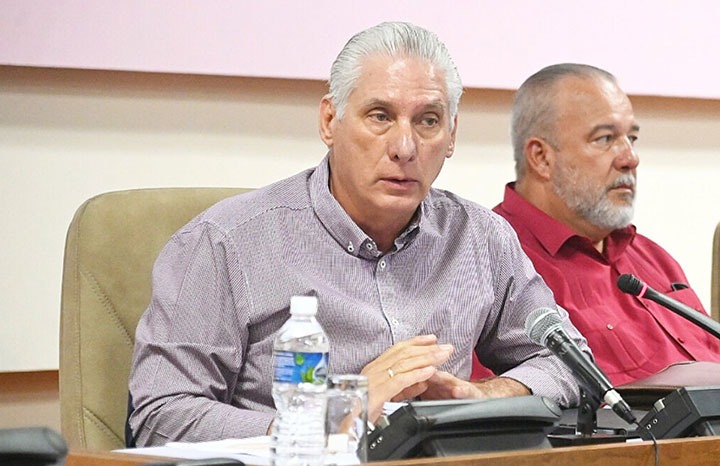Cuban authorities met for two days with leaders of organizations, institutions, and entities concerned with solving the main problems facing Havana today.
Led by the President of the Republic of Cuba, Miguel Díaz-Canel Bermúdez, the Havana Convention Center was the setting for an exercise that aimed to address quickly, intensively, and with the greatest possible order to a city where unresolved challenges have been piling up, and where there are currently three issues that require the coordination of multiple forces: electricity distribution, water supply, and solid waste collection.
Since the inertia was broken on Friday, one of the main lessons learned from everything being done is that, in a short time, the work has been organized. This is how the head of state reflected, who also spoke of other lessons learned: First, he said, we must be aware of the great scope of a goal whose essence is to organize and clean the city, which will require—as the president reasoned—maintaining the pace of effort.
The other lesson—as Díaz-Canel Bermúdez put it—has to do with identifying in detail “daily problems that have been accumulating.” At this point in his speech, he referred to an issue such as fuel distribution, where multiple irregularities have been occurring related to the points where tankers, trucks, and other equipment must be fueled, and where practice has made clear the need for strict control.
Life is telling us that these hours will yield a greater capacity to regulate the modes of operation, the president reflected, inviting us to “learn the best experiences from this exercise.”
On the topic of electricity and its distribution, the First Secretary of the Central Committee of the Communist Party of Cuba emphasized the importance of respecting each schedule that is designed. And regarding the complex situation the country is experiencing with its National Electricity System, he spoke about the value of saving and ensuring that all economic actors consume what is established. Those who exceed their limits, even if they can afford the cost, will have to stop, the dignitary reasoned, appropriately in a context where restrictions must be uniform.
Regarding water service, Díaz-Canel Bermúdez emphasized that priority for this vital service must be given, at this time and to the extent that a recovery is seen, to those who suffer the greatest delays in consumption. He also indicated that strict control systems should be set up at water filling stations.
Referring to the complaints to which the population is entitled and which are often due to dissatisfaction with the prolonged absence of a service, the President emphasized that these should be made to the relevant bodies: the Party, the Government, and the responsible institutions; but not by closing streets or other spaces that belong to everyone: “It must be done in a decent, civilized manner, without intruding.”
The president spoke of other instructions: all centers must implement cleaning and ordering measures in their respective areas; We must engage the population, incorporate them into everything we do, and rely on them for control; and regarding fuel distribution, it must be very well organized at every service station, in every location.
“We are going to win the fight,” affirmed the dignitary, who called for “shaking off so much passivity.” Toward the end of his reflections, which focused on the need to have a cleaner, more orderly, and more functional capital, Díaz-Canel Bermúdez emphasized: “We must resolve everything we can resolve,” even, he said, those that seem impossible.
This Saturday’s meeting was straightforward and very concise, also attended by the Prime Minister of the Republic of Cuba, Manuel Marrero Cruz; and the Secretary of Organization of the Central Committee of the Communist Party, Roberto Morales Ojeda—both members of the Political Bureau. Other senior leaders from the Party and the government, as well as from political and mass organizations, were also present.
Under the leadership of Deputy Prime Minister Inés María Chapman Waugh, the situation in the municipalities was reviewed. A ministry has been involved in each of these small areas; and in areas like Central Havana, where the population density and the scale of the challenges are greater, the assistance of the Revolutionary Armed Forces (FAR) is available.
Several leaders expressed key points for these hours: If there is no consistency, the work will not be noticeable; there is still much to be done, and there is still a lot of work to be done; we must inform, inform, and inform.
The Prime Minister referred to the need to control the scarce resources available. He said this in reference to, for example, freight transport and fuel. He also stated that the heads of the institutions must be very clear about the work priorities for the following day; and that meetings must be spaced out, as the goal is to be more on the ground.
“We need a lot of people working, transforming situations,” stated Roberto Morales Ojeda, who emphasized the importance of person-to-person, house-to-house work; while emphasizing that, if all the revolutionary forces are articulated, much can be done.
José Ramón Monteagudo Ruiz, a member of the Secretariat of the Central Committee of the Communist Party and head of its Agri-Food Department, reasoned that “what is needed here is to solve the problem.” He did not overlook the fact that “there is a lot of trash in Havana, a lot of debris, and to collect it, we must be well organized.” He also noted that there are 474 teams, but that success will depend on the level of dedication, oversight, support for the key players, and bringing everyone together.
As stated at the meeting, this will not be just another meeting but rather an important step on a long, difficult, but not impossible path to rebuilding Havana, which so richly deserves.
[ SOURCE: AGENCIA CUBANA DE NOTICIAS ]

